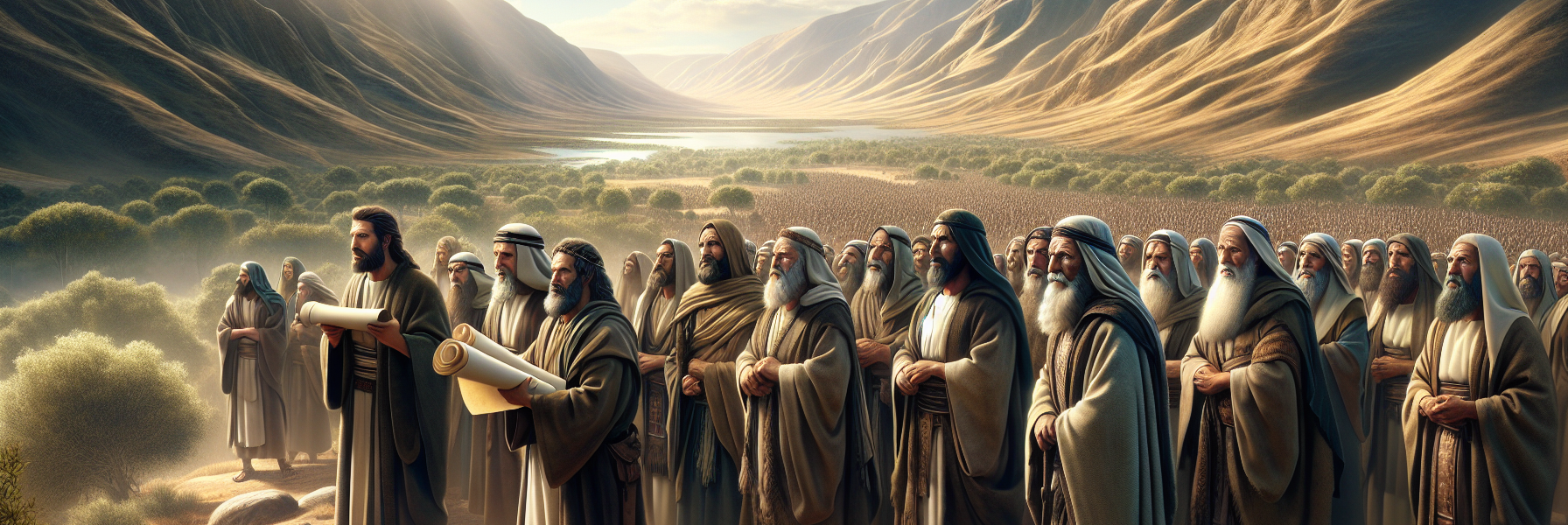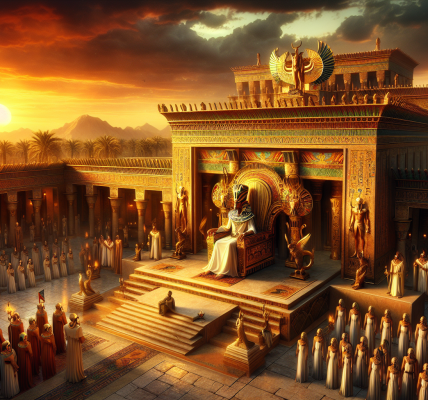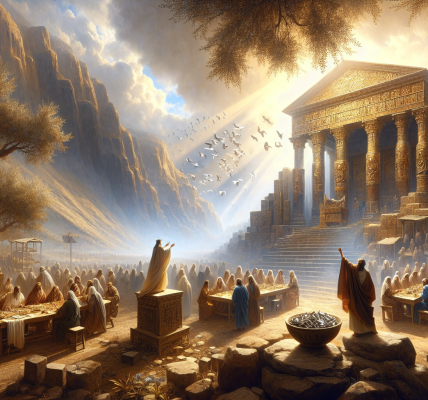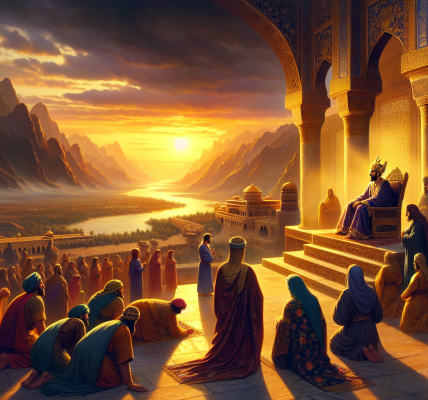**The Inheritance of Judah: A Tale of Faith and Fortitude**
The sun hung high over the land of Canaan, casting golden rays upon the rugged hills and fertile valleys that stretched as far as the eye could see. The tribes of Israel had finally crossed the Jordan, their sandals now treading upon the soil promised to their fathers. Among them, the tribe of Judah stood tall, for theirs was the first lot drawn before the Lord. The weight of destiny rested upon their shoulders, and their hearts burned with anticipation as Joshua, the faithful leader of Israel, prepared to declare their portion.
### **The Borders of Judah’s Land**
With the authority of Moses’ successor and the wisdom of the Lord guiding him, Joshua unfurled the scroll before the assembly. His voice, strong and clear, echoed across the gathered multitude as he proclaimed the boundaries of Judah’s inheritance.
*”To the south,”* he declared, *”your land shall stretch to the border of Edom, through the wilderness of Zin, down to Kadesh-barnea, and onward to Hezron and Adar, curving toward Karka.”* The people listened intently as he described the arid stretches where scorpions lurked beneath rocks and the dry winds whispered through the canyons.
*”Your western border shall be the Great Sea, the mighty Mediterranean,”* Joshua continued, gesturing toward the distant horizon where the waters shimmered like molten silver. Fishermen and traders would one day sail those waves, but for now, the coastlands lay untouched, waiting for Judah’s sons to claim them.
*”To the north,”* he said, *”your boundary shall rise from the Salt Sea’s bay, climb the steep slopes of Beth-hoglah, and pass north of Beth-arabah, ascending to the Stone of Bohan, Reuben’s son.”* The rugged highlands stood as silent sentinels, their cliffs weathered by time and wind.
*”From there, it shall continue to Debir, through the Valley of Achor, turning toward Gilgal, facing the Ascent of Adummim. Then it shall extend to the Waters of En-shemesh and end at En-rogel.”* The people murmured in awe as they envisioned the springs and streams that would nourish their flocks and quench their thirst.
*”The border shall then curve to the north, ascending to the Valley of the Son of Hinnom, passing the Jebusite city—that is, Jerusalem—before rising to the summit of the mountain west of the Hinnom Valley, at the northern end of the Valley of Rephaim.”* The mention of Jerusalem stirred hearts, for though the Jebusites still held it, faith assured them that one day, the stronghold would fall.
*”From the mountaintop, the boundary shall turn toward the spring of Nephtoah, descend to the cities of Mount Ephron, and bend toward Baalah—that is, Kiriath-jearim.”* The forests of Kiriath-jearim whispered of ancient oaks, their branches sheltering the Ark’s resting place in days past.
*”Then it shall extend westward to Mount Seir, pass along to the northern slope of Mount Jearim—that is, Chesalon—descend to Beth-shemesh, and cross to Timnah. From there, it shall proceed north to Ekron’s ridge, curve toward Shikkeron, pass Mount Baalah, and reach Jabneel, ending at the Great Sea once more.”*
The boundaries were vast, a land flowing with milk and honey, yet also filled with fortified cities and giants. But Judah was a lion’s cub, and the Lord their strength.
### **Caleb’s Triumph: The Conquest of Hebron**
Among the men of Judah stood Caleb, his frame still strong despite the years that had passed since he and Joshua had spied out the land. His faith had never wavered, and now, with fire in his eyes, he stepped forward.
*”Give me this hill country that the Lord promised me,”* Caleb declared, his voice unwavering. *”You heard how the Anakim dwell there, in great fortified cities. But if the Lord is with me, I shall drive them out, as He has said.”*
Joshua, remembering Caleb’s faithfulness, blessed him and granted Hebron as his inheritance. With sword in hand and the Lord’s favor upon him, Caleb marched upon the city. The Anakim, towering and fearsome, mocked the old warrior, but their laughter turned to terror when the God of Israel fought for him.
The battle was fierce, but Caleb’s faith was fiercer. The walls of Hebron crumbled before him, and the giants fell like wheat before the sickle. The land that had once filled the spies with dread now belonged to the man who had wholly followed the Lord.
### **The Daughters’ Portion: A Righteous Claim**
Yet not all was war and conquest. Among the people of Judah was a righteous man named Achsah, Caleb’s daughter. She had married Othniel, Caleb’s nephew, who had proven his valor by capturing Kiriath-sepher. As a reward, Caleb gave them land in the Negev.
But Achsah, wise and discerning, saw that the southern fields were dry. She approached her father with boldness and humility.
*”Father,”* she said, kneeling before him, *”you have given me land in the Negev. Now bless me also with springs of water.”*
Caleb, moved by her wisdom, granted her request, bestowing upon her the upper and lower springs. The waters gushed forth, turning the arid ground into a flourishing garden—a testament to faith rewarded.
### **The Unconquered Strongholds**
Yet not all the land was subdued. The Jebusites still held Jerusalem, their walls unbroken. The Canaanites lingered in Gaza, Ashkelon, and Ekron, their defiance a thorn in Israel’s side. But the Lord had not abandoned His people. In time, the faithful would rise, and the enemies of God would fall.
For now, the tribe of Judah settled in their cities—Beersheba with its wells, Lachish with its towers, and Hebron with its ancient oaks. They tilled the soil, raised their families, and worshipped the Lord who had brought them home.
And so, the inheritance of Judah stood as a promise fulfilled and a prophecy yet unfolding—for from this tribe would come a King whose reign would never end.




